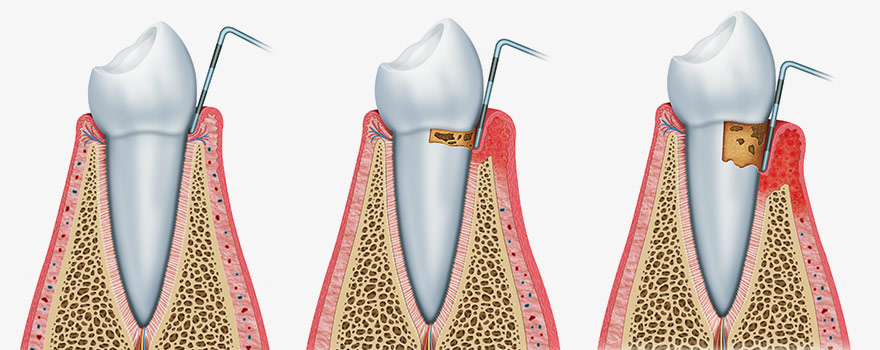Periodontal Surgery in Vancouver
Effective Treatment for Gum Disease and Better Oral Health
At Cambie Marine Gateway Dental, we provide advanced periodontal surgery to address gum disease that persists despite professional dental cleanings and proper home care. Our skilled dental team uses gentle techniques to effectively treat gum disease, reduce inflammation, and safeguard your smile.

What is Periodontal (Gum) Surgery?
Periodontal surgery treats advanced gum disease that cannot be fully resolved by routine dental cleanings alone. Gum disease occurs due to bacteria that accumulate on teeth, causing inflammation, redness, swelling, bleeding, and eventually damaging the gum tissues and supporting bone.
Periodontal surgery involves carefully removing bacterial deposits below the gum line, reshaping gums for better health, and restoring the overall integrity of your gums and bone structure.
Benefits of Periodontal Surgery
Periodontal surgery delivers key benefits, including:
- Thorough removal of plaque, tartar, and bacterial infection
- Improved access and visibility for deep cleaning beneath gums
- Reduced gum inflammation and improved oral health
- Gum reshaping to enhance appearance and facilitate easier cleaning
- Prevention of further bone loss and tooth damage
Periodontal surgery significantly contributes to maintaining your natural teeth and supporting your overall dental health.
Periodontal Surgery Procedure: Step-by-Step
Your periodontal surgery at Cambie Marine Gateway Dental involves the following steps:
Step 1: Local Anesthesia
- We use local anesthetic injections to ensure you remain comfortable and pain-free during the procedure.
Step 2: Gum Tissue Access
- Small, careful incisions are made along the gumline, allowing your dentist to gently lift the gum tissue away from the teeth and expose the roots clearly.
Step 3: Deep Cleaning and Treatment
- Your dentist meticulously removes built-up plaque, tartar, and bacterial deposits using specialized manual and ultrasonic instruments.
- Exposed tooth roots and surrounding bone are thoroughly cleaned to eliminate infection and inflammation.
Step 4: Gum Repositioning and Stitching
- After deep cleaning, the gums are repositioned snugly around your teeth.
- The gums are secured in place with stitches, which typically remain for 7 to 10 days before removal.
What to Expect After Periodontal Surgery
Following your procedure, it is normal to experience:
- Mild soreness and discomfort in the gums (manageable with prescribed or over-the-counter pain relievers)
- Slight gum bleeding and swelling in the treated area
- Temporary tooth sensitivity to temperature and sweet foods or drinks
Proper aftercare helps minimize discomfort and speeds up healing. You will receive detailed instructions, including prescribed antiseptic mouth rinses and advice to temporarily avoid brushing the treated area.
Maintaining Your Results Long-Term
The long-term success of periodontal surgery relies heavily on excellent oral hygiene habits. To maintain healthy gums after surgery:
- Brush and floss thoroughly once your dentist advises it's safe to resume normal cleaning routines.
- Attend all scheduled follow-up appointments for stitch removal and progress evaluation.
- Keep regular dental visits and professional cleanings every 3 to 6 months to prevent future gum disease.
Consistent care and maintenance will help preserve your natural teeth and ensure lasting gum health.
Book Your Periodontal Surgery Consultation Today
Take action to treat gum disease and protect your oral health. Schedule your periodontal surgery consultation at Cambie Marine Gateway Dental in Vancouver.
Our dedicated team is ready to help you achieve healthier gums and a brighter smile.
